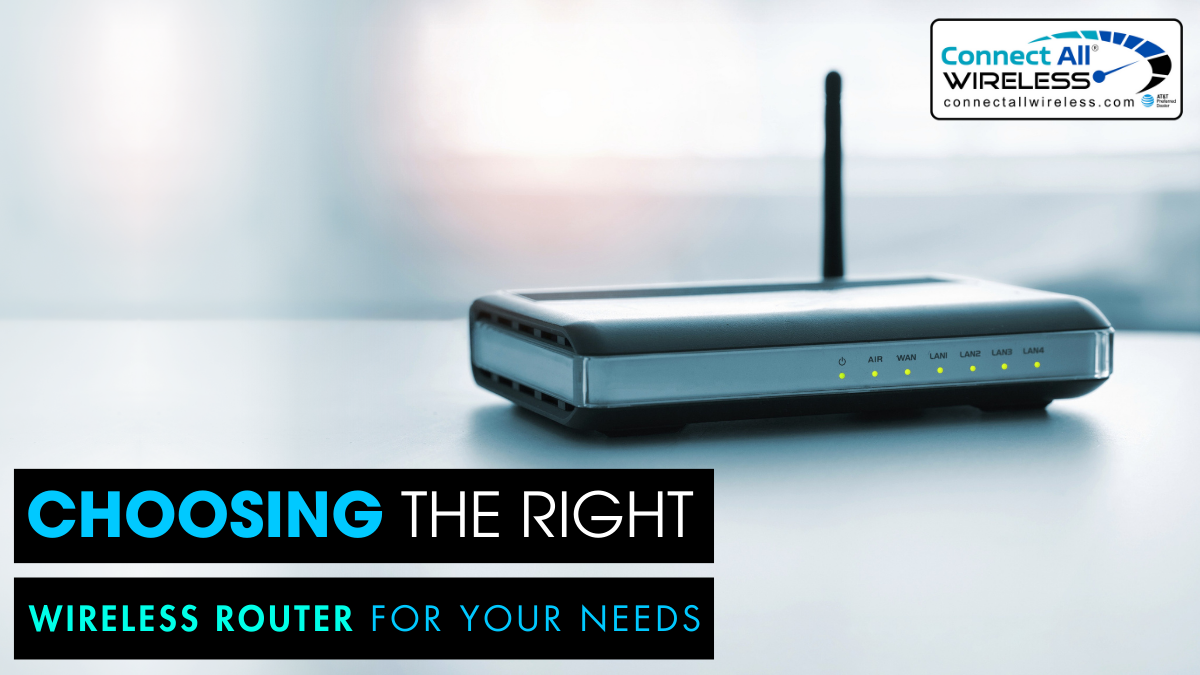Choosing the Right Wireless Router for Your Needs
April 19, 2024In today’s digitally connected world, a reliable wireless router is the backbone of any home or office network. With the multitude of options available on the market, selecting the perfect wireless router can be a daunting task. However, by understanding your specific needs and considering key factors, you can make an informed decision that ensures optimal performance and satisfaction. In this guide, we’ll explore the essential considerations to help you choose the right wireless router for your needs.
Assess Your Requirements:
Before diving into the sea of available options, take a moment to assess your requirements. Consider factors such as the size of your space, the number of devices that will be connected, and the internet speed provided by your ISP (Internet Service Provider). Understanding your needs will narrow down the options and guide your decision-making process.
Wi-Fi Standards:
Wireless routers come in various standards, such as 802.11n, 802.11ac, and the latest 802.11ax (Wi-Fi 6). Each standard offers different speeds, coverage, and compatibility with devices. For example, if you have many modern devices that support Wi-Fi 6, investing in a Wi-Fi 6 router will future-proof your network and provide faster speeds and better performance.
Speed and Performance:
Internet speed is a crucial factor in choosing a wireless router. Look for routers that support the maximum speed offered by your internet plan. Additionally, consider factors like dual-band or tri-band capability, which can provide faster speeds and less interference in crowded Wi-Fi environments.
Range and Coverage:
The range and coverage of a wireless router determine how far the Wi-Fi signal can reach within your home or office. If you have a large space or multiple floors, opt for a router with strong signal strength and beamforming technology, which focuses the signal towards connected devices for better coverage.
Number of Antennas:
The number and type of antennas on a router can impact its performance and coverage. Routers with multiple external antennas tend to provide better coverage and signal strength compared to those with internal antennas. However, internal antennas offer a sleeker design and may be more suitable for smaller spaces.
Security Features:
Security is paramount when it comes to wireless routers, especially with the increasing prevalence of cyber threats. Look for routers with built-in security features such as WPA3 encryption, firewall protection, and automatic firmware updates. Additionally, consider routers that offer guest network support and parental controls for added security and control over your network.
Ease of Setup and Management:
Setting up and managing a wireless router should be intuitive and user-friendly. Look for routers with easy-to-use web interfaces or dedicated mobile apps that allow you to customize settings, monitor network activity, and perform firmware updates effortlessly. Some routers even offer voice control features for hands-free management.
Additional Features:
Consider any additional features or functionalities that may enhance your networking experience. This could include USB ports for connecting external storage devices or printers, VPN support for secure remote access, and Quality of Service (QoS) prioritization for optimizing bandwidth for specific applications or devices.
Budget:
Lastly, consider your budget when choosing a wireless router. While it’s tempting to opt for the latest and greatest model with all the bells and whistles, there are plenty of affordable options that offer excellent performance and reliability. Set a budget and prioritize features based on your needs to find the best value for your money.
Conclusion:
In conclusion, selecting the ideal wireless router tailored to your specific requirements is paramount for ensuring seamless connectivity and optimal performance in today’s digitally-driven world. With the proliferation of internet-connected devices and the increasing demand for high-speed internet, choosing the right router has never been more critical. By carefully evaluating factors such as Wi-Fi standards, speed and performance, range and coverage, security features, ease of setup and management, additional functionalities, and budget constraints, you can make an informed decision that meets your needs and preferences.
Moreover, with the advent of Gig Wireless Internet in Michigan, the importance of selecting a capable wireless router is further underscored. Gigabit-speed internet offers unparalleled bandwidth and faster connections, enabling smoother streaming, gaming, and productivity. To leverage the full potential of Gig Wireless Internet in Michigan, investing in a router that supports the latest Wi-Fi standards and offers robust security features is essential. Additionally, prioritizing routers with advanced technologies like beamforming and MU-MIMO can enhance coverage and network performance, ensuring a superior online experience for all users.
In essence, choosing the right wireless router is not a one-size-fits-all endeavor but rather a tailored process that considers individual needs, technological advancements, and budgetary constraints. By conducting thorough research, comparing options, and seeking advice from trusted sources, you can find the perfect router that complements your Gig Wireless Internet in Michigan, providing reliable connectivity and empowering you to make the most of your digital lifestyle.


